Do you want to study for free in South Korea? Who wouldn’t? The great news is that you can apply for the fully funded Global Korea Scholarship program. How? You will find everything about GKS graduate (GKS-G) 2024-2025!
To attract more international students to Korea, the government plans to increase foreign admissions to 200,000 by 2032. As a result, they will offer more scholarships to international students.
If you wish to study at the forefront of global pop culture, consider applying for the Global Korea Scholarship. There are plenty of top-ranked universities and courses to choose from.
There are many good reasons to study in Korea. Korean universities open up many opportunities in an ever-growing and competitive job market, like today.
TABLE OF CONTENTS
- What is the Global Korea Scholarship?
- About Universities, Courses, Seats, and Tracks
- Available Universities and Courses
- Eligibility Criteria For GKS Postgraduate
- Documents for 2024-2025 GKS-G
- Instructions and points to remember
- Scholarship Value and Benefits
- How to Apply?
- Contact
- 2024-2025 GKS Graduate FAQs
What is the Global Korea Scholarship?
The Global Korea Scholarship (GKS) program is a yearly initiative of the government of the Republic of Korea. Before, the name was KGSP, which stands for the Korean Government Scholarship Program.
The GKS offers academic scholarships to deserving students from different countries who wish to study in Korea.
The National Institute for International Education (NIIED) administers GKS. They manage on behalf of the Ministry of Education in Korea.
The program gives students a once-in-a-lifetime chance to earn their undergraduate, graduate, and Ph.D. degrees in Korea.

The objective of the GKS
GKS is an excellent opportunity for scholars across the globe. It enables them to pursue higher studies at educational institutions in Korea.
This motivates students to get admission to South Korea’s prestigious and best universities.
Many Korean universities take part in GKS graduate. And offer Bachelor’s, Master’s, doctorate, and research studies to aspiring candidates. This makes GKS the most popular and extensive Korean scholarship program globally.
GKS boosts international exchange in education. Besides, this fosters “mutual friendship” between South Korea and other participating countries.
Through GKS, the Korean government promotes Korean culture, brand value, and the Korean language. It gives many great reasons to study Korean, take TOPIK, and explore various aspects of Korea to boost their chances of getting GKS.
Benefits of GKS Korean Scholarship
Korea is a famous study-abroad destination for students worldwide for many reasons.
First, it is a fantastic place to explore. It is renowned for its technological advancements and courses at the top-ranked universities.
With this program, you’ll be able to study at well-known universities.
Since this is a 100% government-backed scholarship, it’s totally free.
There is no cost associated with the scholarship program. This means the selected students will not have to worry about living expenses. That’s right!
While we’re talking about benefits, it’s important to mention that a scholarship like this can significantly boost your CV.
On top of all this, the Global Korea Scholarship can help you learn Korean. Getting TOPIK level 3 is a condition before enrolling in a degree program.
You will improve your Korean language skills through immersion and practice with locals. This will sweeten your chances of finding Korean-speaking jobs.
About Universities, Courses, Seats, and Tracks
Let’s find out everything about courses, their duration, and how to apply for them.
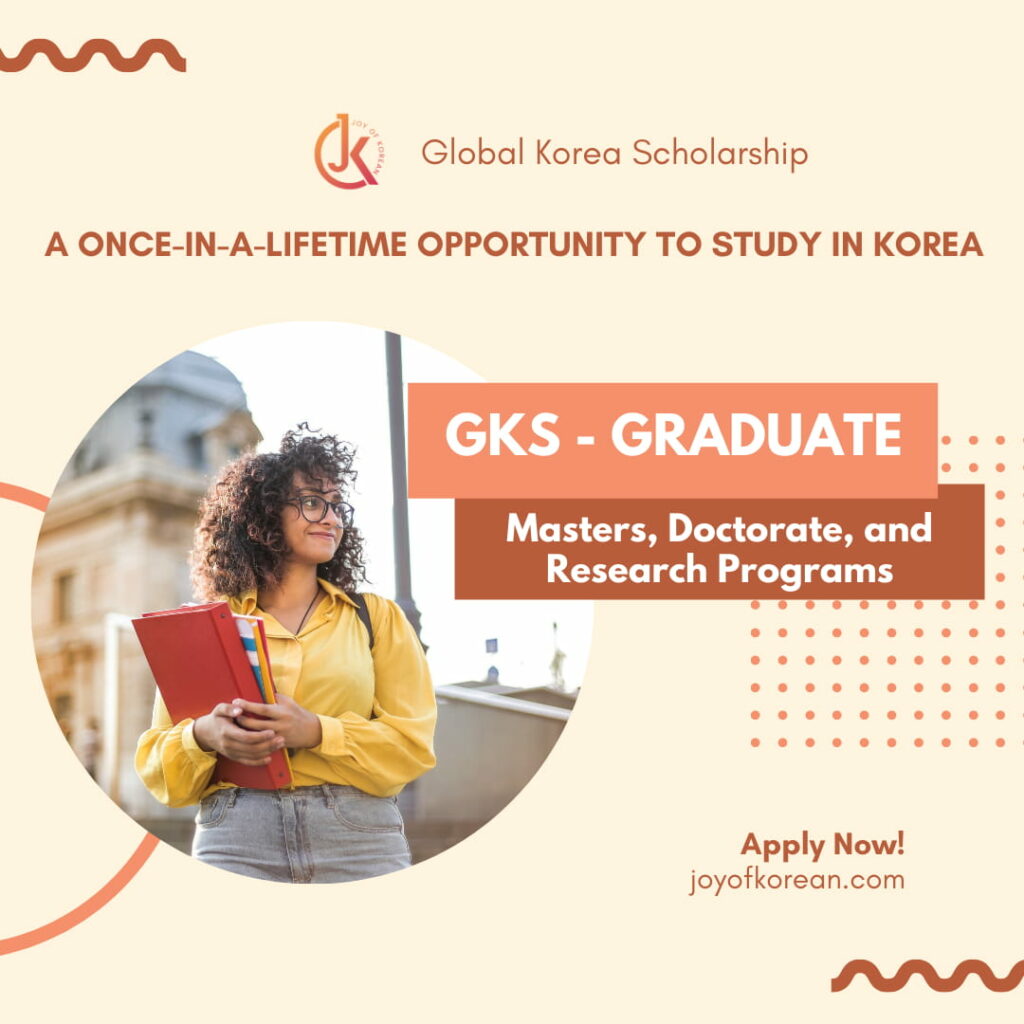
What is the GKS Graduate Scholarship period?
- Master’s: The duration is three years. This includes 1-year of Korean language classes and 2-years of degree coursework.
- Doctoral: Ph.D. takes four years. It comprises one year of Korean language study followed by three years of Ph.D. study.
- Research Program: It is usually a one-year or six-month scholarship program.
Role of Korean training and TOPIK in GKS-G
Students must take a one-year Korean training course at an allotted center.
Those who have completed TOPIK 5 or 6 can skip the Korean language course. Instead, you can enroll directly in a degree program.
The TOPIK certificate is valid for 2 years. Thus, you must have passed the previous year, and its validity should not expire. NIIED updates the deadline to submit and the last test they consider.
GKS scholars who receive TOPIK level 5 or 6 within the first six months of the Korean program. They don’t need to finish the remaining 6 months of language training. As a result, they can start their degree program in the following semester (March 2024).
Upon completing a 1-year compulsory Korean learning, all GKS scholars must achieve at least TOPIK level 3. If not, they cannot continue with the degree program.
Number of seats for GKS Graduate
A total of 1278 scholarships are available for GKS masters, doctorate, and research programs for 2024-2025.
The embassy track and the university track are two different types. There are 663 available through the embassy, and the remaining 615 are from the universities.
Candidates will receive 100% funded scholarships. This covers all costs regardless of the channel they apply through.
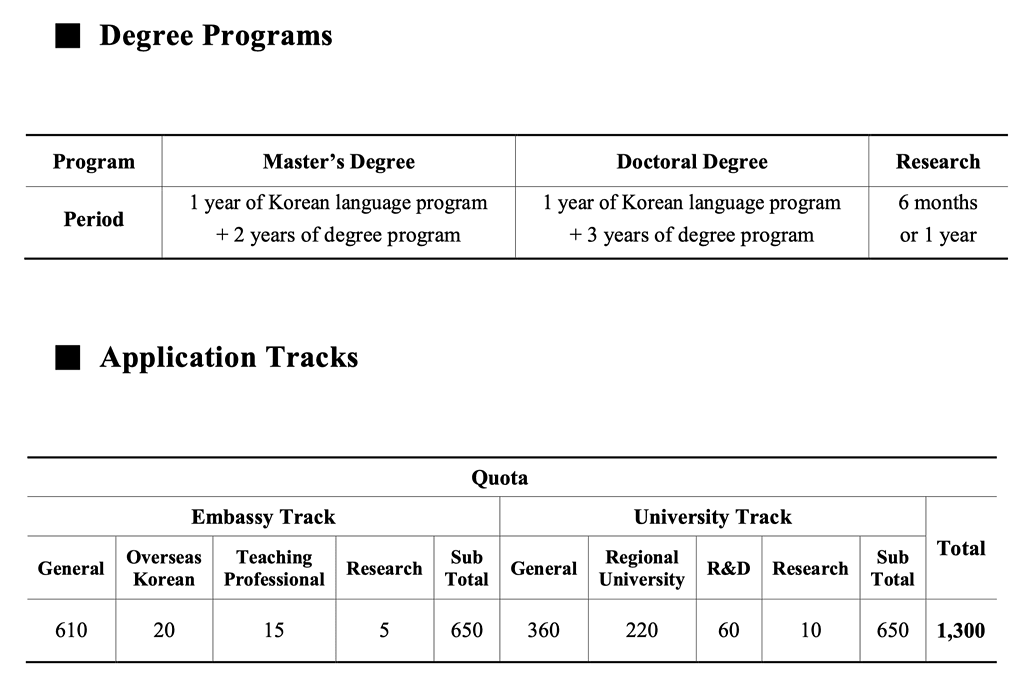
Total seats for Embassy Track
Of all the 1278 GKS seats, 663 are available for the embassy track.
This includes 603 General + 20 Overseas Koreans + 30 Korean Language Teaching Professionals.
In the general category, they chose 603 candidates from 145 countries.
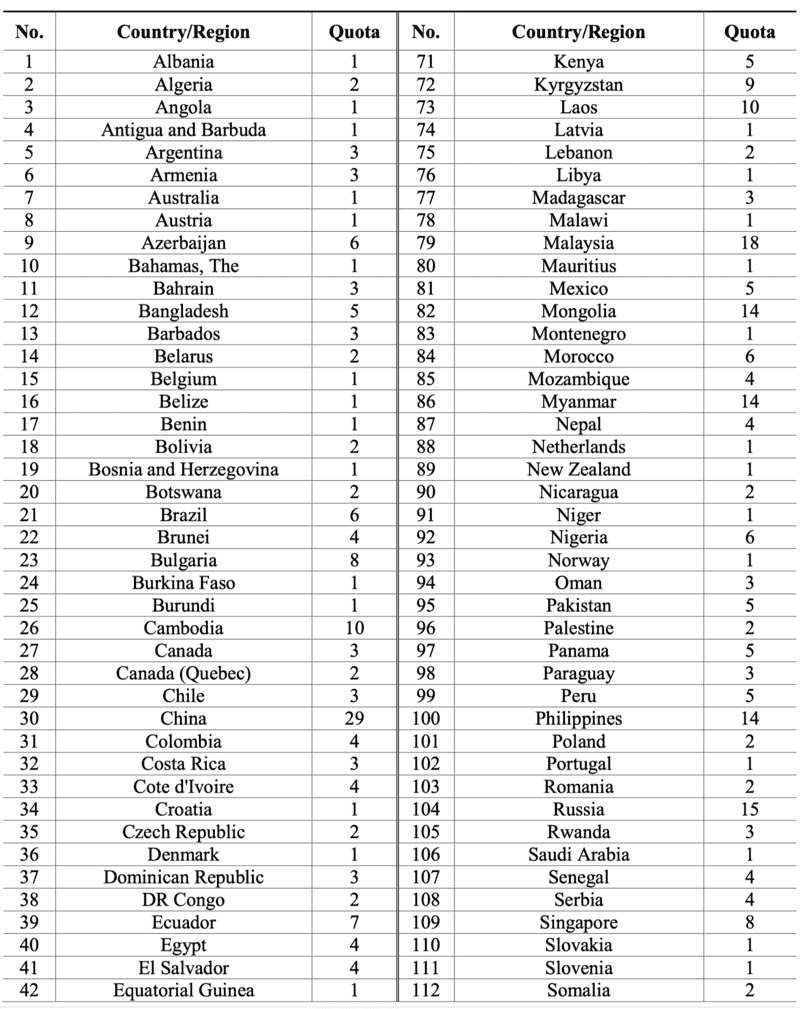
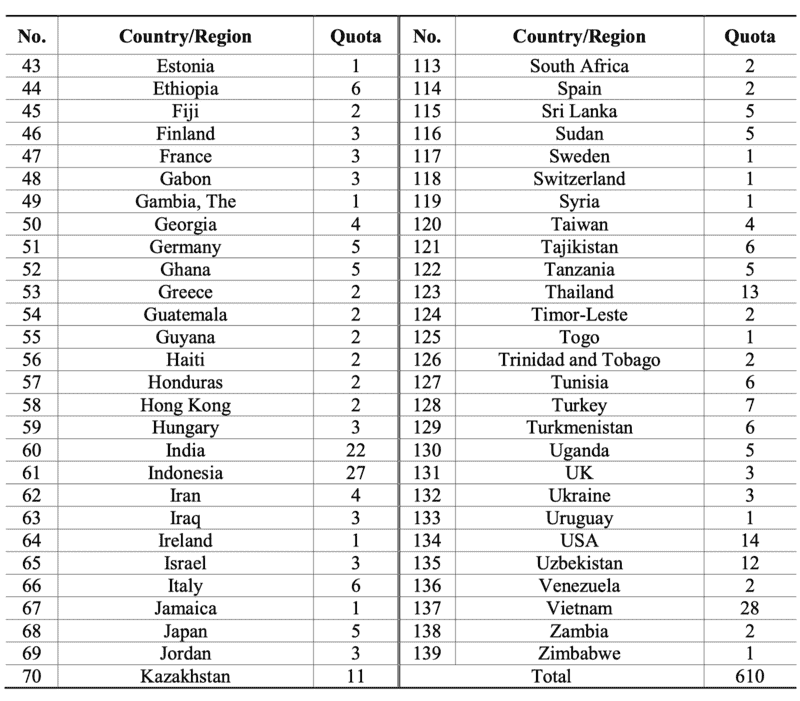
They have reserved 20 quotas for overseas Koreans from 13 nations and 30 seats for Korean language teachers from 24 countries.
They also select 10 candidates for the research programs. So there are five quotas from five countries (Armenia, India, Pakistan, Ethiopia, and Turkey). And they pick the remaining 5 from 145 participating nations as mentioned in the list.
Korean language instructors cover school teachers and professors at universities. Also, they should teach Korean at a government-approved institution.
The government-authorized education institution does not include for-profit after-school academies, institutions, or organizations.
Total seats for University Track
Five seats on the university track are not subject to a country’s quotas. Thus, any applicant from 76 NIIED-designated nations can apply.
See the quota for General Program and Science & Engineering majors of the Regional University Program below.
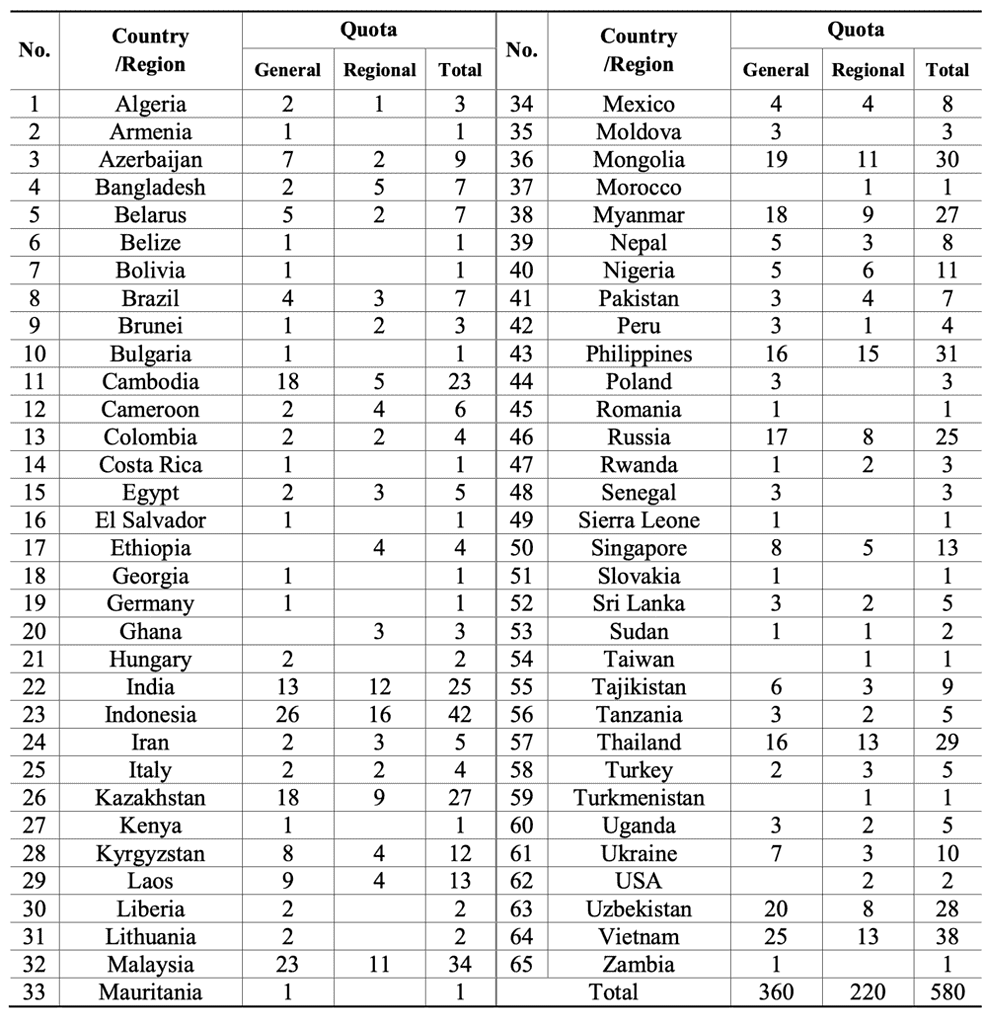
Available Universities and Courses
Partner Universities
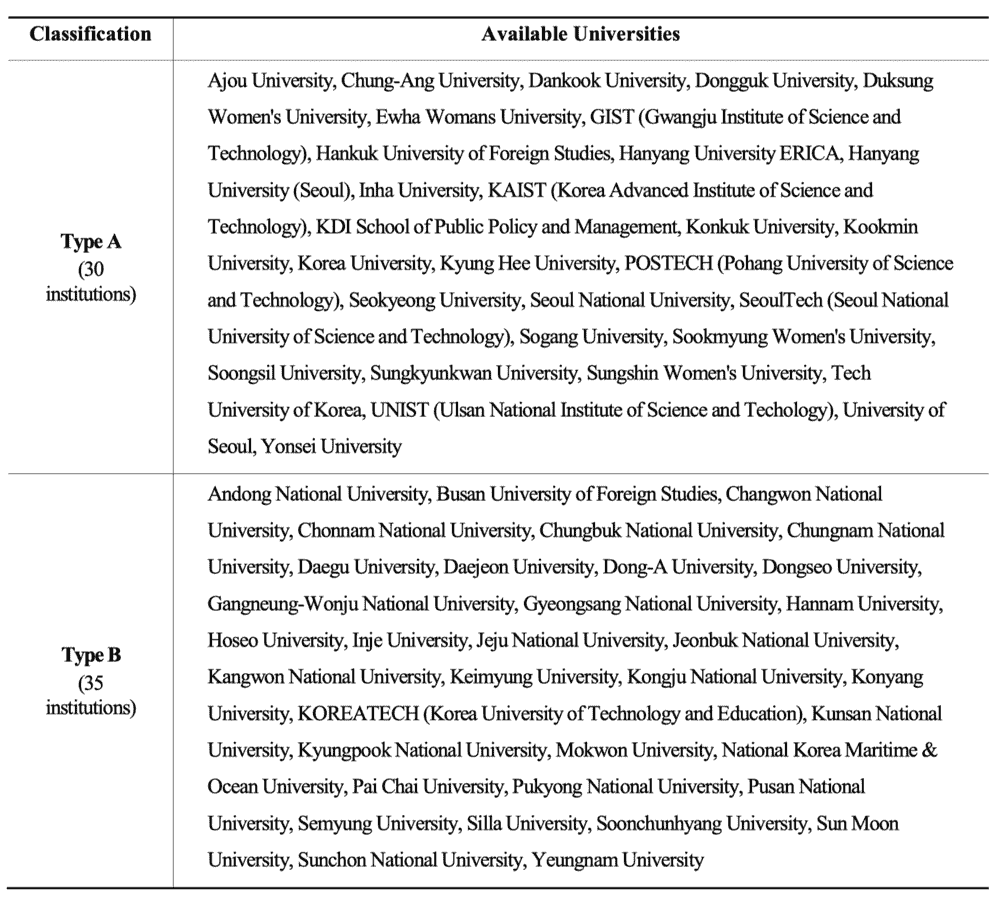
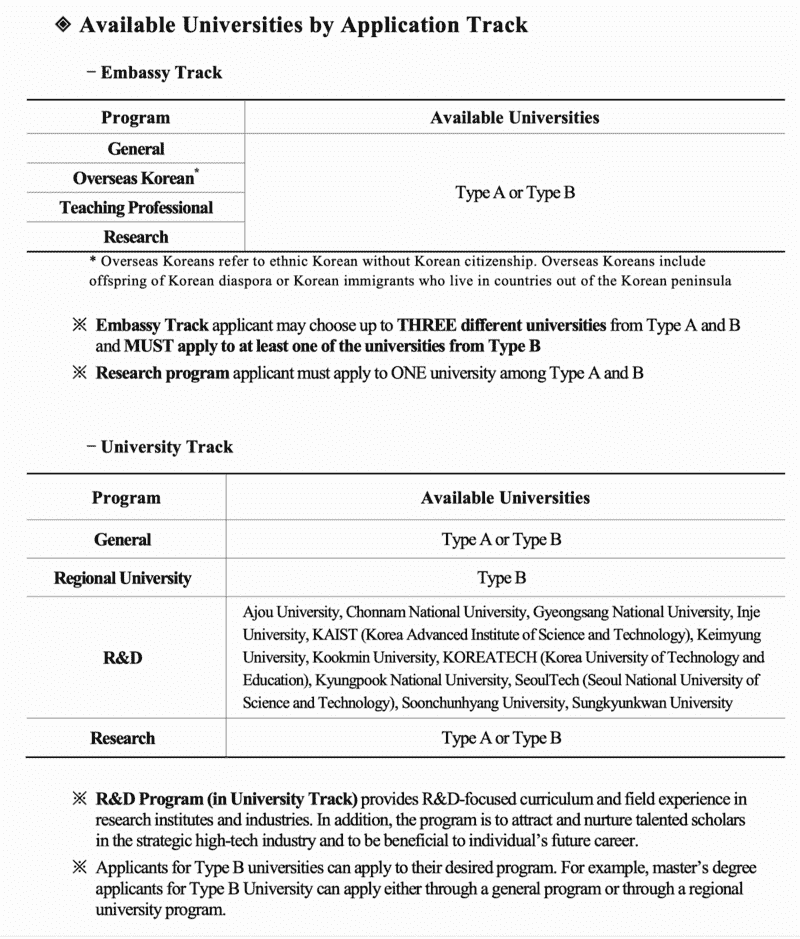
The R&D program is a new addition to the University Track. This course provides R&D-focused training and hands-on experience in research institutes and industries. In addition, the program aims to attract students to the field. Talented scholars in high-tech strategic sectors can be nurtured to benefit their future careers.
Applicants interested in Science and Engineering majors in the Regional University program should select a Type B university. Also, candidates should choose a Type A or Type B to apply to other university track programs (general and research programs).
Candidates applying for the Embassy track must select THREE different universities. And the major should be from the 59 universities listed above. Besides, it must include at least one university of Type B.
Available Fields of Study
- Applicants must select their majors (fields of study) listed in the ‘2024 GKS graduate Available Universities & Fields of Study’ file.
- As for the application Guidelines, visit www.studyinkorea.go.kr and check the GKS noticeboard for details and updates.
- Candidates should check with the respective university about the languages used to teach in each class. Applicants must read and review all the information on individual majors before applying. (You can refer to Appendix C. contact information of Korean universities)
- The short-term seasonal (evenings or night school), online, and distant courses are unavailable. And hence, they do not permit admission.
Eligibility Criteria For GKS Postgraduate
GKS graduate programs have many requirements that candidates must meet. NIIED has set the following eligibility criteria for the GKS graduate scholarship.
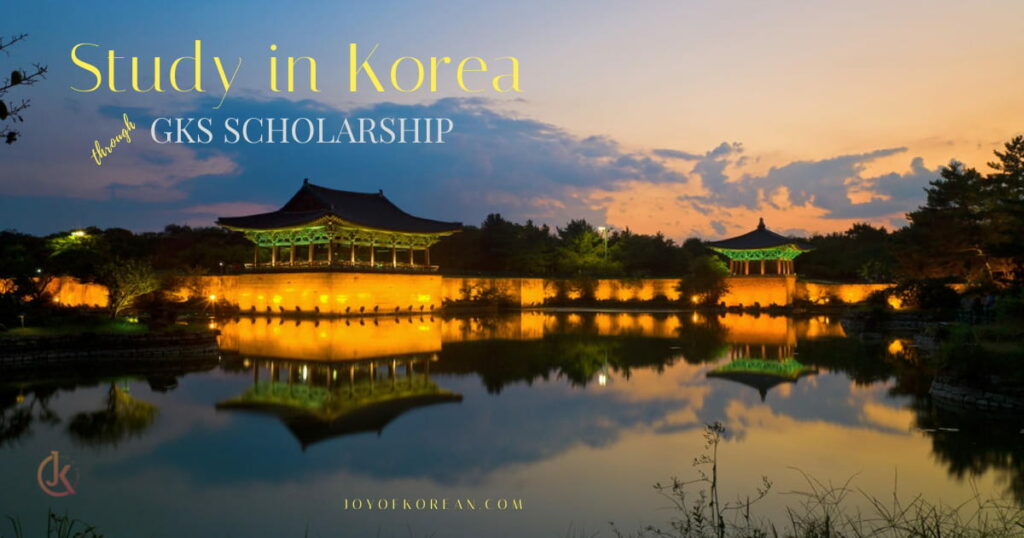
Nationality
- The applicants and their parents must not be citizens of South Korea.
- Dual citizens who are also citizens of the Republic of Korea are not eligible.
- All applicants must hold citizenship from one of the invited nations selected by the NIIED. Yet, the parent (s) may be nationals of countries that do not participate in the GKS graduate program.
- There is an exception in the embassy track for overseas Koreans with Japanese citizenship. If their parents have a “Permanent Residency Permit” in Japan and have Korean citizenship, they can apply.
- They need documentation proving the renunciation of Korean citizenship for all applicants. This is also for their parents, who earlier held Korean citizenship.
Age
For postgraduate GKS scholarship, applicants must be under 40 years of age (born after September 1, 1982).
Academic professors born after September 1, 1979, and under 45 years of age as of September 1, 2024, are also eligible to apply. They also must be citizens of one of the 107 countries designated as official development assistance (ODA) recipients.
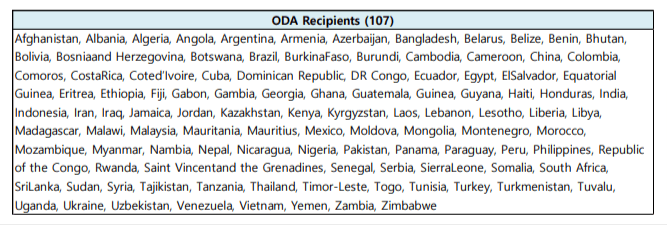
Degree Requirements
For a Master’s program, one requires a bachelor’s degree or education similar to or higher than a UG degree.
For a doctoral program, one needs a master’s degree or education or equivalent or higher than a UG degree.
For the research program, you need to receive an invitation from one of the partner universities and must meet the criteria below:
- Postdoctoral Research Program: To be eligible, one requires a doctoral degree by February 28, 2024.
- Professor Exchange Program: One needs a Master’s degree or higher and must teach at a university as a professor.
- Program for Education, Science, Culture, and International Cooperation Professionals. One needs a Master’s degree or higher and must be a professional in the same (E.S.C.I.) Field.
Notes for appearing candidates / those whose results are awaited
You can also apply if you expect to graduate by August 31, 2024. In that case, you need first to submit a certificate of expected graduation. If you get the GKS graduate, you must submit the final academic transcript to NIIED before or by August 31, 2024.
Grade required
From their respective universities, applicants must maintain a cumulative grade point average (CGPA) of or higher than any one of the following:
- The CGPA: 2.64/4.0, 2.80/4.3, 2.91/4.5, or 3.23/5.0
- The score percentile must be 80% or above on a 100 point scale. You are also eligible if you rank within the top 20% of your class at the last educational institution you attended.
If an applicant holds a transcript without information on grade point average or cannot convert grades into one of the GPA criteria mentioned above. In that scenario, one must submit an official document issued by the applicant’s university describing the university’s grading system.
Health
- To complete the duration of their degree in Korea, an applicant must be in good mental and physical health.
- They may disqualify an applicant who fails a drug test or suffers from a serious illness. If such a thing prevents them from studying in Korea for a long time during the final selection round.
All applicants must submit a “Form 8 Personal Medical Assessment” as part of the application process. Also, all candidates who pass the 2nd round of selection must undergo a comprehensive medical examination. Then, they need to submit an official medical test conducted by a licensed doctor or hospital.
Upon arrival in Korea, all GKS graduate scholars will undergo a medical examination administered by the NIIED. Upon arrival in Korea, they will disqualify GKS scholars from scholarship if they suffer from a severe illness after the medical test.
GKS scholars reapplying to the GKS-G program
The former or current GKS scholars (earlier known as KGSP) who meet the added criteria below are eligible to apply for GKS for the Master’s program:
- The applicant needs a grade point average of at least 90% or more on a 100-point scale. Or one ranks within the top 10% of one’s class.
- The applicant must hold a TOPIK level of 5 or 6. This should be a valid certificate within the 2-year expiry period.
Former or current GKS scholars can only reapply once for a higher degree program.
- Bachelor’s → Masters,
- Master’s → Doctoral or Research (Professor Exchange Program, Program for E.S.C.I. Professionals),
- Doctoral → Research.
They prefer applicants with natural science and engineering majors in the Ph.D. research program.
All current and previous GKS scholars re-selected as GKS scholars in 2024 do not need to take Korean language courses.
Korean Language Teaching Professionals
Applicants can apply to the program if they meet the following additional criteria:
- Applicants must be elementary and secondary school teachers, university lecturers, or professors who teach Korean at a government-approved educational institution. They don’t consider for-profit after-school academies, institutions, and organizations as they are not government-authorized educational institutions.
- The applicants need at least two years of teaching experience as of February 28, 2024.
- You require level 4 of TOPIK or higher (They accept certificates earned after January 1, 2021). Check the TOPIK test schedule.
- Candidates must have a major in the Korean language and should choose the same while picking their major/field of study.
Applicants may opt out of the Korean language program if they want.
Restrictions
Students who have graduated from a Korean high school or university are ineligible to apply. Overseas Korean adoptees and former GKS Scholars are exceptions.
Students who have earlier studied at a Korean university on an exchange or as visiting students can apply.
Previous GKS (KGSP) selected applicants who have withdrawn from the scholarship cannot apply. It includes those who did not come to Korea after being picked as GKS scholars and resigning from their studies. Or disqualified during their scholarship period.
There is an exception for former GKS scholars who lost their scholarships because of failing to pass TOPIK level 3 or above. After completing the Korean course, they can reapply if they have passed TOPIK level 5.
Candidates can only select and apply for only one track.
Applicants have to pick one of these 4 options for the embassy track. — General, overseas Korean adoptees, Korean language teaching professionals, or research programs.
For the university track: applicants have to decide on one of 3 choices. — General, research programs, or science and engineering majors at a regional university.
Documents for 2024-2025 GKS-G
Before applying, let’s find all the relevant documents and things you need to remember.
Mandatory documents for (Masters, Ph.D., and Research Program)
- Complete Application Form (Form 1)
- Personal Statement (Form 2)
- Two Letters of Recommendation (Form 5)
- GKS Applicant Agreement (Form 7)
- Personal Medical Assessment (Form 8)
- Applicant’s Proof of Citizenship Document (Original)
- Applicant’s Parent’s Proof of Citizenship Document (Original)
Optional documents for (Masters, Ph.D., and Research Program)
- Certificate of valid Korean test, only TOPIK score.
- Certificate of valid English Ability exam (TOEIC, IELTS, TOEFL, etc.)
- Published books & research papers, etc.
- Awards and other certificates
- Applicant’s passport copy
Documents according to the programs and candidates
- Statement of Purpose (Form 3) — For masters and doctoral programs.
- Document for Bachelor’s degree and its transcript — For masters and doctoral programs.
- Document for Master’s degree and its transcript — For doctoral and research program.
- Documents for Overseas Korean, Korean Citizenship Renunciation, Korean Adoptee (Original and Optional). This only applies to relevant applicants.
- Certificate of Employment (teaching subject) and certification of a teaching career (years taught). (Original and Optional). This is only for Korean teaching professionals for UG bachelor’s and master’s programs.
Documents only for research programs
- Research Proposal (Form 4)
- University’s Official Letter of Invitation (Form 6)
- Original documents for the doctoral degree and its transcript. This only applies to postdoctoral research programs.
- Certificate of Employment (Original)
The second round of successful applicants also needs to give the results of the complete medical examination.
Instructions and points to remember
You need to keep these vital things in mind while applying and sending documents.
Pointers on filling out the application forms
- All documents must be in either Korean or English.
- The applicant’s English name must match the name on their passport.
- Applicants must submit 2 letters of recommendation from two different recommenders. They should be the ones who can assess the applicant’s academic abilities. Seal it in an envelope and then send it to the embassy or university that conducts the first selection round.
- Examples of preferred recommenders should be academic advisors or the dean (department head). Or a professional in one’s field of study. If a research program applicant is currently working at a research institute. Then, applicants must submit letters from the organization’s head (or research institute).
Pointers about required documents
- Document requirements may vary. It depends on which embassy or university conducts the first-round selection. Thus, applicants should check the university or embassy website regarding document submission requirements.
- Candidates must submit 1 set of original documents and 3 sets of photocopied documents for the Embassy track.
- They disqualify those documents that are fraudulent or incomplete. They also lose scholarships, even for the selected applicant.
- If the university requests supplementary documentation beyond NIIED’s requirements. Then, the applicant should submit those documents directly to the university.
- You may submit photocopies of published books, research papers, awards, or other relevant documents.
Instructions on ‘Certificates’
- The application documents should all be originals. Let’s say an applicant submitted photocopies. Then, one needs to apostilled or do consular confirmation. Afterward, one can submit these certified documents. From 2022, they won’t accept notarized ones.
- If applicants feel they won’t get their academic documents reissued in the future. Then, they submit apostle or consular-confirmed educational documents. This is in place of the original ones. They may not return all the submitted papers to the applicants.
- The notary public must notarize the translation of documents other than Korean or English.
- For proof of citizenship, each applicant must submit a copy of their family register or birth certificate. Also, applicants and their parents should submit non-notarized passport copies if their citizenship is not on their documents.
- Korean Language Teaching Professionals need “Certificates for Employment” and “Certificate for Teaching Careers.” They should mention teaching subjects and must include the Korean language.
Scholarship Value and Benefits
Below is a complete breakdown of the scholarship value:
- As long as you purchase economy class tickets, they will provide you with the actual airfare.
- You will receive a one-time KRW 200,000 as a resettlement allowance when you arrive in Korea.
- Postgraduate students receive a monthly living allowance of KRW 100,000 (masters and doctoral) and 1,500,000 (research program).
- All candidates receive free national health insurance worth 20,000 KRW. They provide it twice a year at the start of each semester.
- They cover the total cost of language courses, up to a maximum of 800,000 KRW a quarter.
- You will get reimbursement for the actual tuition fee costs (no more than KRW 5 million per semester).
- Students with valid TOPIK levels 5 or 6 receive a reward of KRW 100,000 per month. That’s one of the advantages of TOPIK.
- As a research support fee, you get 210,000 KRW for L.S. (Liberal Arts and Social Science majors) and 240,000 KRW for N.S. & E (Natural Science & Engineering majors).
- Applicants also get a one-time thesis actual printing expense of 500,000~800,000 KRW.
- After completing the degree at the time of final departure, the student receives KRW 100,000.
How to Apply?
The application period is usually February-March for GKS graduate programs (Masters, Doctorate, and Research). In contrast, GKS for undergraduates takes place in September.
Visit the official Korean government website for all relevant information. You can also access the application forms.
Those who wish to apply for the Global Korea Scholarship Program can do so in two ways. We know these as ‘the embassy track’ and ‘the university track.’
Choosing one or the other track depends primarily on the applicant and their country of origin.
This is because countries receive different quotas and channels. It depends on what place you are from. You may pick either the embassy or university track or both.
Let’s take a closer look at both tracks in detail.
The Selection Processes
There are two ways.

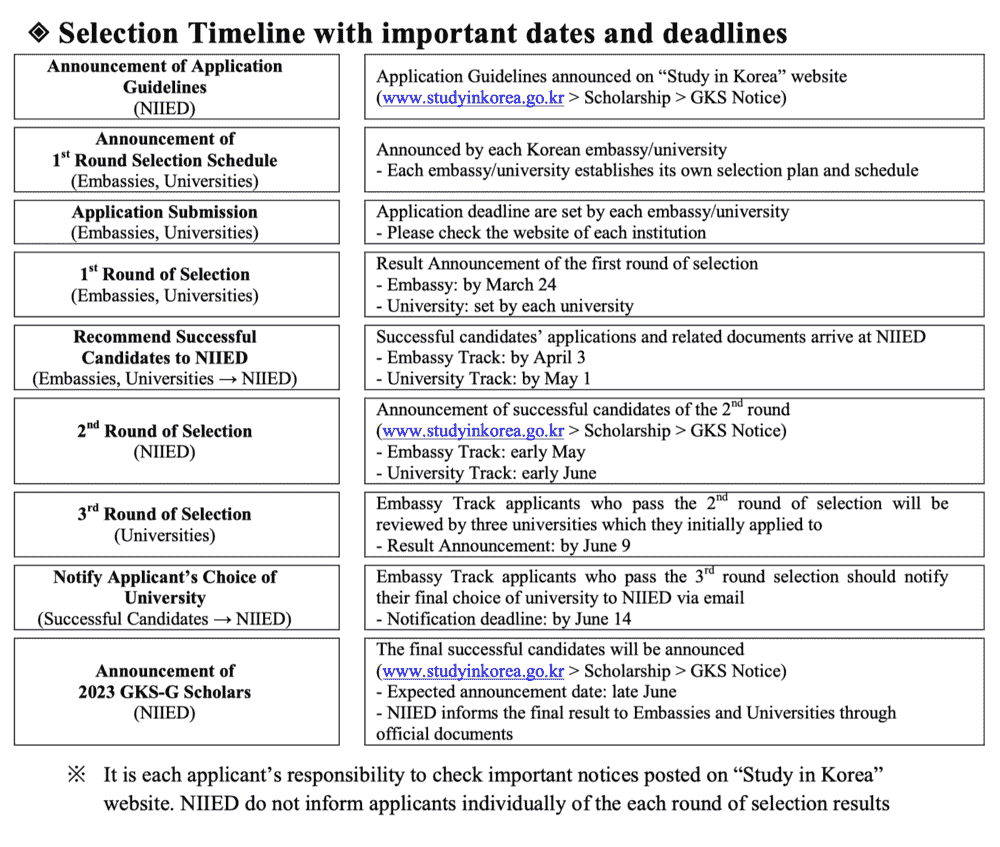
Embassy Track
The most significant difference between both tracks is applying to 3 different universities through the embassy track.
On this track, the applicant must apply to the Korean embassy in their country.
They award scholarships to students if one of three universities accepts their applications. There are three rounds on this track.
University Track
This route requires applicants to submit their applications directly to the Korean university they wish to attend.
The applicant becomes a GKS scholar once the university accepts their application. Unlike the embassy track, which comprises three stages (Embassy * NIIED * University), the university track is just two stages (University → NIIED).
Procedure
The selection process is simple. However, depending on your chosen track, you may encounter diverse rounds during the selection process.
First Round
The NIIED first invites its Korean embassies and domestic universities to recommend candidates. Students can then send their applications to the preferred Korean college or their home country’s embassy.
After reviewing the applications, the embassies and universities recommend candidates to NIIED.
Second Round
After the first round is over, the NIIED evaluates applicants who passed. They selected the university track applicants as GKS grantees at the end of the evaluation process.
Candidates who go with the embassy track will advance to the third round.
Third Round
The universities review the applicants in the third round. At least one university must admit the candidate to pass this round.
As soon as a university accepts the candidate as a student, they become GKS scholars.
Selection Criteria
During the selection process, a committee evaluates each applicant.
The selection criteria and committees can vary from round to round. Still, some factors can contribute to an applicant’s selection.
Personal Statement
In this statement, applicants must describe their motivation to apply for the GKS graduate scholarship.
Besides, the candidate can discuss their interests or background.
Research Proposal or Statement of Purpose
Applicants must outline their goals and study plans. Applicants may also address their future goals.
Let’s say the applicant is applying for a research program. They must state their research plan and goals in this case.
Recommendation letters
Candidates may submit letters of recommendation. The importance of these letters varies from university to university.
Language test certificate (English or Korean)
Certificates of language ability may also affect your evaluation. For example, they give preference to candidates who already know Korean well.
Various other factors
Other factors are publications, awards, academic transcripts, extra-curriculum activities, achievements, interview performance, etc.
Evaluation Preference
Certain factors can help you get some extra points and enhance your prospects.
TOPIK level 3 or above can fetch you extra points, 10% of total allocated points. Plus, they give preference if you submit scores of English language tests like TOEFL, TOEIC, IELTS.
They give preference to Ph.D. degree holders in Natural Science and Engineering for research programs. You get an edge for majors in the same field if they have to pick on the same marks as other candidates.
Professors are currently teaching and belong to one of 104 ODA countries. Then, they get preference when they decide on the same marks.
They also give preference and extra points to descendants of Korean War veterans (5% of the total points), low-income and underprivileged families, third-generation overseas Koreans, and majors under the industrial, professional training project.
Medical assessment
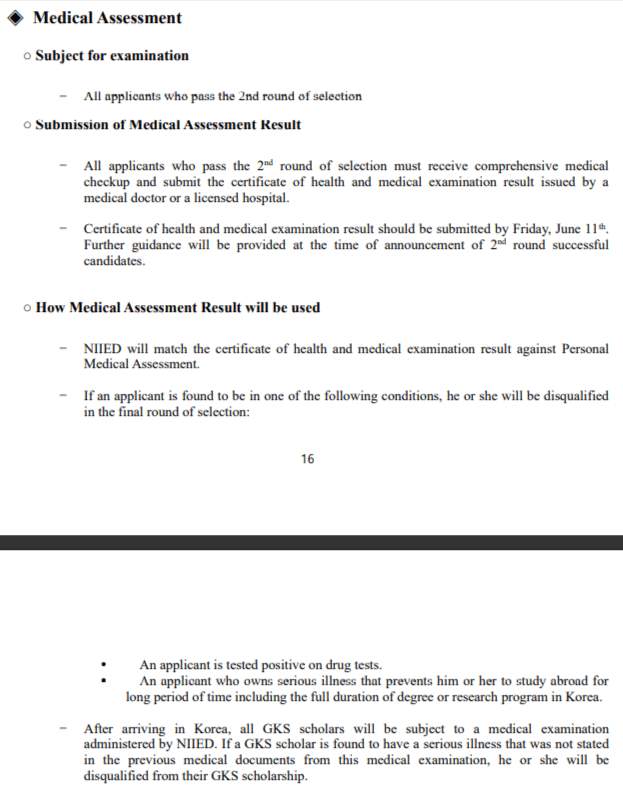
When and How to Submit
Each country has its own deadline for submitting applications. It may vary between 3 and 4 weeks. This is because the embassy of the country in question sets these deadlines.
The rules and guidelines also differ across universities and embassies. So, check with concerned embassies for updates and accurate information.
An unsuccessful candidate for an embassy track can reapply to a university track. But this is not possible if the candidate has cleared the first round.
The applicants from China and the Czech Republic must apply directly to the CSC under the Ministry of Education in China and the Czech Ministry of Education. This is because of the bilateral agreement.
Depending on which program you choose, the deadline will also vary. You can find all about the Global Korea Scholarship program on the official website.
Contact
- Email: kgspniied@korea.kr
- Phone: 82-2-3668-1364
- Address: 191, Jeongjail-ro, Bundang-gu, Seongnam-si, Gyeonggi-do (13557), South Korea.
- Websites: studyinkorea.go.kr (official site), (mofa.go.kr – Ministry of Foreign Affairs), Korea.net (Korean Portal), sejonghakdang.org (learning Korean), academyinfo.go.kr (for Higher Education in South Korea), and immigration.go.kr and hikorea.go.kr (Immigration and Visa).
You can find GKS updates, announcements, and guidelines on the GKS noticeboard section of the site.
2024-2025 GKS Graduate FAQs
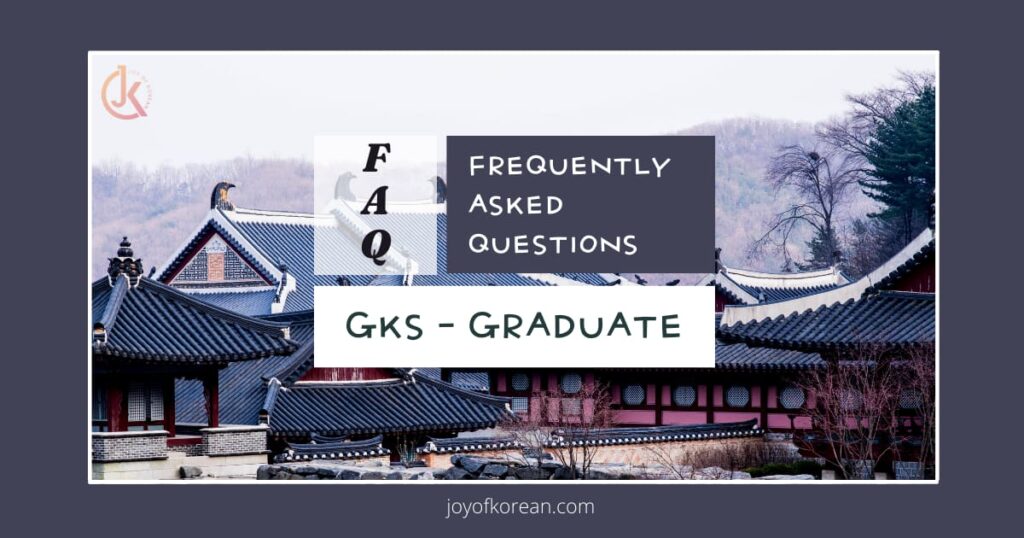
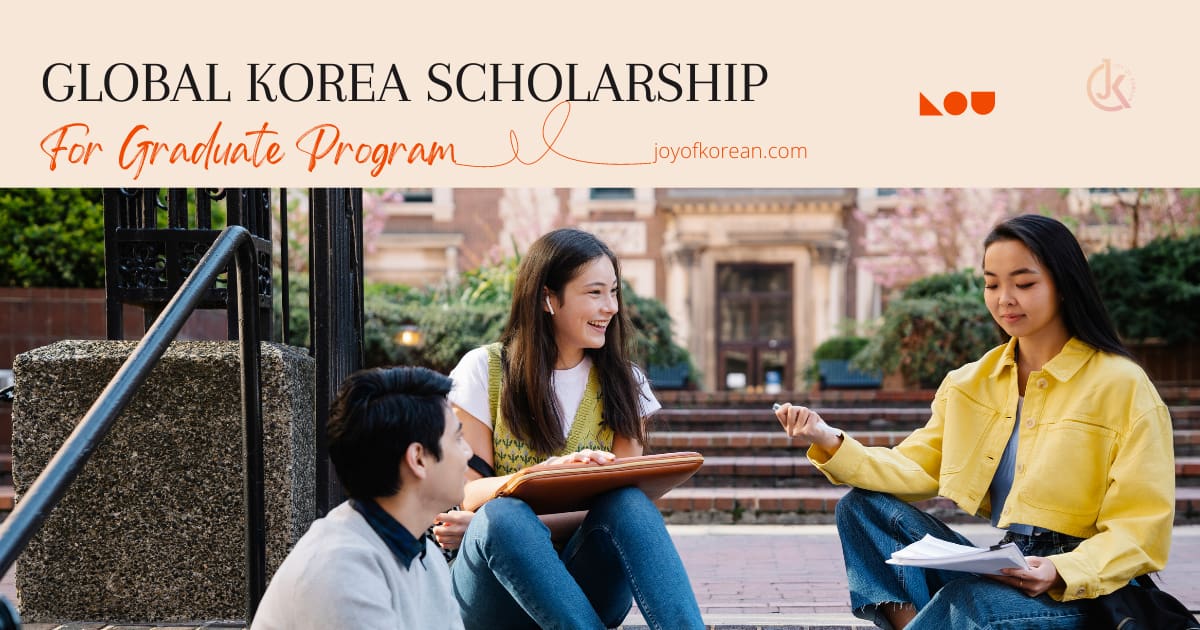

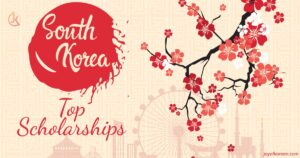

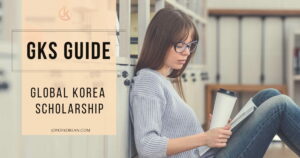

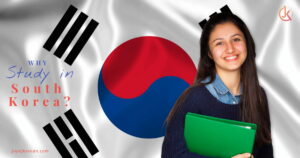




1) Can we submit a passport copy as proof of citizenship?
2) Do we need to apostille our passports?
3) Regarding my parents’ proof, My mother died 9 months ago! so is a Death certificate enough for my mother’s proof?
4) Can we submit an Aadhar card as proof for my parents? (In India Aadhar is government-issued proof.)
It would be better to check Indian government guidelines for Indians once they publish in about a month. It will provide all the necessary details.
I want to apply for South Korea scholarship.
You can apply when the application process starts. For example, GKS-G begins in Feb every year.
Greetings!
Dear Sir/madam
I am from Ethiopia and I have a master Degree in Aquatic Ecosystem Management. I have an interest in learning for a PhD at your University. So, can you please help me to get the universities website related to my profession?
thank you.
Hello please, I graduated froma university with thirs class. Can I still apply for this scholarship?
No
How did u apply for the graduates, I still cant find the application form
Check your country-specific site as forms and deadlines vary.
Hello, I scored less than 50% on my Bachelor’s degree. Can I still apply for this Scholarship? Am I eligible for this?
Unfortunately, no. One needs a minimum of 80% or rank within 20% of the class of the concerned institutions to apply.
When does the programme start for GKS-S? Is it in September or August?
For GKS-UG, its usually in September and GKS-G, it is in February.
Hi, I have a master’s degree and would like to apply for the GKS-Graduate program (it means I’d like to have a second master’s degree). Would this be possible?
Or can I apply for GKS-G using my bachelor’s degree only? Thank you so much in advance!
Yes, you can try for GKS-Graduate based on your bachelor’s degree. Your existing master’s degree won’t matter much.
Any other scholarship opportunities that we can try for other than gks? If yes please post more information on that! Thank you!
There are few, but not many seats and choices like GKS.
Hi Sir, since I’m not sure of my result being out by August 2023, I will have to apply next year in February/March, thereby joining the academic year of 2025 right?
Yes, you will apply next year for the academic session 2024-25.
I have completed my Masters in advertising and media. But I wish to do a second Masters – MBA from South Korea. Can I use my Masters marks to apply to GKS scholarship for MBA or just use my graduation Marks?
You only need graduation for a Master’s.
I want to know the postgraduate application deadline.
The dates vary depending on the country, though usually it is between Feb end to mid March. Check with the local embassy or the arrangement is done by NIIED.
Hello, I have scored 79% on my Bachelor’s Degree, is that okay for pursuing a master’s degree?
A minimum of 80% is required to apply for GKS-G.
Hello, I have got 71% in my final exm can I apply for master’s degree?
You need a minimum of 80% or need to rank within the top 20% of your previous class.
I’m interested to hear how I can enroll Korean university from Bangladesh?
Search colleges, shortlist based on your target course, budget, and eligibility criteria, and apply. Or contact any consultant dealing with higher education in Korea.
Hello Sir, are there any master’s courses available for international students pursuing BSc Agriculture UG? If yes, can I get it through gks scholarship? Especially in SNU.
Hope you will reply ☺️
Maybe, but I do not track individual courses as there are hundreds of them. If available, you can apply for GKS if you fit their requirement.
I need this scholarship.
Hello! I recently heard someone that the GKS Scholarship is not applicable for Korean language course, say from SNU LEI. Is this true? Thank you in advance!
Possible since they teach Korean to all selected candidates who haven’t passed TOPIK level 3. Plus, a master’s in Korean requires one to be advanced level in the language which is not the case with GKS as anyone can apply for any course.
I want to apply but am in Nigeria and am 17yrsold no international passport pls I need help
Then not possible. Check the requirement for the same.
Sir.
How many subjects in master?
Sorry, I didn’t get you.
Hi, my name is Princy. I am from India. I have already emailed my professor at the Korean university, do I have to wait for his reply, or do I have to submit my document to Embassy first? What should I do next??
You can only apply for GKS-G in Feb/March as per available courses/universties.
I am currently studying at university, but I haven’t graduated yet. So can I apply immediately after I graduate? Thank you!
Yes, as long as you fulfill the eligibility criteria.
Hi I’m expecting to finish my higher national diploma in banking and finance by 2024 so can i apply for gks or can I apply with the national diploma and study business administration? If yes, what can I do sir thanks.
I am not sure about that. You can check if MBA related courses are available, and if you fit the requirement, you can apply accordingly.
Hello sir!!
I wanted to ask you that can I get this scholarship if I scored below 80% in 10th but above 80% in 12th?
Yes, but overall academic track record matters.
I think u can’t 🤔
Good morning sir, I’m a student in the final year, my undergraduate program, and it will end in December 2022, but the graduation ceremony can take place in May 2023, is it possible to apply for master’s degree unless I have a certificate?
You can apply as an appearing student. But you do have to submit final degree before departure if in case you are selected.
Respected Teacher
I am currently studying in the 5th semester (last year) of my graduation. And I will graduate in July 2023 cause our university’s rule is this. Can I apply for a GKS scholarship in 2023 for my master’s study?
Yes, if you expect to get your results by Aug/Sept 2023.
To whom it may concern,
I hope this message finds you well.
My name is Yasmine Al-Aqrabi, I am 15 years old, and I would like to apply for a scholarship for the 7th-grade level in South Korea. I am passionate about education and I hope to enhance my academic and cultural skills in an exceptional learning environment.
Thank you very much for considering my application, and I look forward to the wonderful opportunity to be part of this program.
Sincerely,
Yasmine Al-Aqrabi
My civil engineering (bachelor’s) has finished, so can I choose architecture for my Master’s?
You can choose if your preferred course is available and you are eligible. But getting selected depends on many factors, including your previous academic background.
Hi, if you can do good research about universities, can you please check the Artificial Intelligence or Robotics Course too? I’m a Computer Engineering Graduate (bachelor).
I want to study AI or robotics Engineering. I did conduct research but couldn’t find much. My preferred university is SNU. Korea University, KAIST, and Seoul Tech are also good. Any University is acceptable as long as I can study AI or Robotics. So, can you please help with that? 😅
I haven’t checked the latest colleges an courses. You can check, and if it’s not available, you have to look for other ways beyond GKS.
can you please help me out,
1: What is the deadline for postgraduate for Pakistan?
2: we need 80% for this scholarship or a 2.7 CGPA (it’s weird that a 2.7 CGPA is not even 60% of marks) I got a 3.2 CGPA. Is it ok to apply?
3: I did my master’s in journalism and production, and I want to apply for another master’s in film studies now. is GKS also covering the media and film field?
4: Can I have your email id?
1. For that, you have to check the Pakistani Government site that deals with scholarships to foreign countries. There you will find all the details, though usually the process starts in February.
2. You need 80% or more and as per mentioned CGPA. You can also try a few website that helps convert into such CGPA and percentile.
3. You have to check the available courses in their list.
4. You can submit the form, or ask in the comment section.
I am Bella from Nigeria I have gotten my Higher national diploma (HND) with a total GPA of 2.96 I graduated in 2022, and I studied Banking and finance with the result which I acquire can I apply for a master’s degree in Gks?
Yes, if you are elgibile for the requirements.
I want to apply for a bachelor’s degree I have more than 80% in high school. In the university track, how can we send documents to the university?
Directly to the Korean university. It has just two stages (University — NIIED).
This explained everything from minor details to the big things. This was such a good article. But I’m still afraid of applying 😞. I don’t know why, even though I am eligible to apply.
Can you please tell me (1) What is a notarized document and what is a consular verified document? (2) How do we get to do this? I am from Pakistan. Aap Roman, Urdu, Hindi mein likh dain Sir, shyd smjh aa jaye. 😞
If you are eligible and wish to get scholarship to study there, you should apply with a positive frame of mind.
Notarized is a document certified by the notary public. On the other hand, consular or apostille authentication serves the purpose of making public documents legally recognized in foreign countries.
Hi there, thanks for such a thorough and informative post. I was wondering, do the letters of recommendation have to come from an academic institution? I’ve been out of school for a few years (I received my bachelor’s degree in December 2020), so I’m not sure I’d be able to get a recommendation from a professor that is dated within 1 year of the application since I haven’t been a student in several years.
Is there a way around this? Can I use professional recommendations from a job or volunteer program? or would perhaps going back to school to take a course or two be beneficial to try to secure an academic recommendation? Thanks in advance for any advice you can share.
The recommendation letter is required from the educational institutions where you pursued the course should be within one year. You can still get from college and school with the current date that will benefit you. There is no mentioned of professional ones, so not sure if it be of any use.
I want to do a PhD.
Hey sir
I jus graduated from high school can I apply for this GKSG, or will I have to wait for the normal gks form to come out.. and please, when will the form for the 2024 GKS com out coz I think 2023 form come out last year. I’m kind of confused sir 🥺💔 please
If you have completed 12th or equivalent, you can apply for GKS in Sept or Oct 2023 for the academic term 2024. Yes, last year for 2023.
Hello,
I have a question regarding the recommendation letter for the embassy track. I thought only one was required, but you wrote that we need two? Also, I‘m confused about submitting original certificates. It says they cannot be returned, so do I need to ask my previous university to mail me another original?
Thanks,
Karen
2 recommendation letters are required from two recommender as stated in the original document. You need to submit the original copies. All details are there.
Could you tell me what is mean by embassy track and university track? I’m applying for an abroad scholarship for first time, so.
There are two different ways to apply for GKS. All details are mentioned in this article.
Hey sir can international student apply GKS with low high school transcript grade
A minimum of 80% or equivalent, or being in the top 10% is the requirement for all candidates, regardless of country.
Hello sir. I have graduated last year I studied banking and finance with a total GPA of 2.96 and I want to go for master’s degree can I apply for the Gks scholarship?
If your GPA fits the criteria, surely you can apply.
Can we do masters in nursing under gks scholarship?
If such program is available, then, yes.
Where can I get the application form? And where to submit?
On the official site studyinkorea.go.kr. All details are there in this article.
Dear admission committee:
Please could you extend the deadline for the application? I am from Ethiopia, Tigray regional state due to the war that happened in the past 2 years internet connection was not opened but is now open. I am trying to finish my application process as can as possible. Submitting documents to the embassy takes at least 3 or 4 days. Please consider my interest if it is possible. I am very interested in studying in Korea.
Dear admission committee:
Please could you extend the deadline for the application? I am from Ethiopia, Tigray regional state due to the war that happened in the past 2 years internet connection was not opened but it is now open. I am trying to finish my application process as can as possible. Submitting documents to the embassy takes at least 3 or 4 days. Please consider my interest if it is possible. I am very interested to study in Korea.
Hello, I have a few inquiries about the GKS scholarship.
1. Can I change my master’s major from what I studied for my undergrad degree?
2. Does GKS offer scholarships to students that apply in the spring?
3. May I apply simultaneously for the embassy and university tracks?
1. Yes 2. No 3. Yes, but you can apply only one university and do follow all the procedure.
Hello Vikash Gupta,
I have applied via Embassy track (to Korean Embassy in Addis Ababa, Ethiopia ) using DHL Post and delivered, but no response yet as to at what stage the evaluation and or screening is. Can you please brief me about this?
Check with the Embassy in your country.
Can you please tell me the starting date of gks and the valid link?
For GKS-UG, September-October, and GKS-G in Feb-March. Website → studyinkorea.go.kr/en
Hello sir! Recently I have completed my graduation and I got two recommendation letters from different recommenders, but these were not sealed in envelop. I am confused as you mentioned above that we are supposed to submit sealed recommendation letters so what should I do?
Recommendation letters need to be sealed as per GKS guidelines. They may reject if it does not follows the instructions.
Hello sir, I have some questions it is better if you answer all of them:)
1. I’m about to finish my bachelor degree (this year). But before finishing, the time of applying to the GKS may come. What should I do if I can’t get diploma or GPA result? Can I provide the copies or not
2. Now I’m in Uzbekistan. I just checked the dates of applying; they told me it will be upcoming February is it real?
3. If I get this scholarship before entering any universities in Korea, it may provide me some choices to apply any universities that I want?
Thank you in advance!
1. You need final result along with apostille documents as appearing students can’t apply.
2. Yes
3. No, you can’t choose any other university. You get a particular one that you pick during application.
Hi, I have a question regarding the requirements, hope you can solve it! 🙂
I studied veterinary medicine (5-year degree instead of 4) and in my country. I can already do a PhD with no Master’s (due to the longer degree). Do you know if that possibility exists in Korea? Because it is said that “For a doctoral program, one needs a master’s degree or education or *equivalent*” But it also asks to attach the master’s results. Is there any official contact email I can use for this kind of question?
Thank you so much! ^^
If they ask for masters which is the normal case in most places, you require Master’s degree. I am not aware if there is such contact detail. Try on the official site.
Hello, Sir my name is Baljinder Kaur. I just completed my senior secondary education and I got 80%. Can I apply for gks in 2024 (Feb and March) please reply.
Thanks
Yes, depending on other criterias.
Hi am currently working person. I am going to apply for my masters through GKS Scholarship. Since i graduate its been 2 years. Can i get my recommendation letter from my office manager insted of any professors or teacher?? Can i get recommendation letter from manager or CEO or HR is ok??
I guess no as recommendation letter is based on your educational performance and done by teacher at existing acdemic centers.
Hii wanna ask can they accept 3 years or 2 years study gap?if i have a master degree of 3 years ago can i apply after 3 years in PHD?
I guess, yes they do accept. Do check the exact age limitation and minimum year of passing in the official document.
I have a bachelor’s degree in social work but I want to apply for a master’s degree in international relations. Is it possible?
Possible, but continuation may boost some chances.
Hi! I’m preparing for my GKS-G application right now, and this blog has been real helpful. I just have a question: For the Personal Health Assessment, I might need to declare a certain condition I was diagnosed with in 2020. But I’m taking oral medication for managing it. Technically, I have been living healthily and working normally since my diagnosis.
So far in my preparations, the personal health assessment is what I have been dreading the most, because I’m concerned that if they see my condition, my application would be fully disregarded right from the start 🙁 Would it be alright to add a medical certificate on the Other Documents section, even if not yet required? Since my treatment doctor gave me one which states I am fit to study and work overseas, and that I’m taking continuous medicine to manage it.
I’ve been dreaming about GKS back when it was still KGSP in 2018, so I’m looking for assurance that there’s still a chance for me. Thank you so much in advance!
Well, you must disclose all your medical situation, regardless of whether they accept or decline.
I’m having bachelor’s degree in business administration in HR stream if can any possible to apply for a master’s degree in information technology field ? and my graduation is still running (last sem-6) so where we can apply for master’s on after completion of before ?
It would be challenging as it’s pretty competitive and has many prerequisites.
Hello,
Actually I have just completed my class 12th now (2023-2024 batch), now I plan to take a drop and apply for GKS in Sept. 2024. Will me being a dropper affect my chances of getting selected or am I eligible for applying if I am a dropper?
No, it won’t matter. You can drop and try GKS. However, considering there are only a few seats, I’d suggest have plan B and get enrolled for bachelors’s degree elsewhere too.
Hello Sir,
As an Indian college going student currently I am doing my bachelors and you know the graduation usually happen in the mid of July and August but the GKS-G application form comes on Feb then how can I show my Degree?? And what if my result wasn’t declared by August 31st? Then what am I supposed to do?? Because as a middle class belonging child I cannot waste that much time.
You cannot apply as an appearing students since you need final degree. Yes, one would waste one year, but this is the way it is. As an alternative, you can take admission in any course as plan B.
What if after getting this scholarship we start our college understand course along with the one year long mandatory korean language program , then get the scholarship amount from 2 nd semester?? Is this possible?
No
Can a medical certificate preemptively submitted in the Other Documents section potentially alleviate concerns about a health condition affecting an applicant’s chances of being accepted into the Global Korea Scholarships program?”,
“refusal